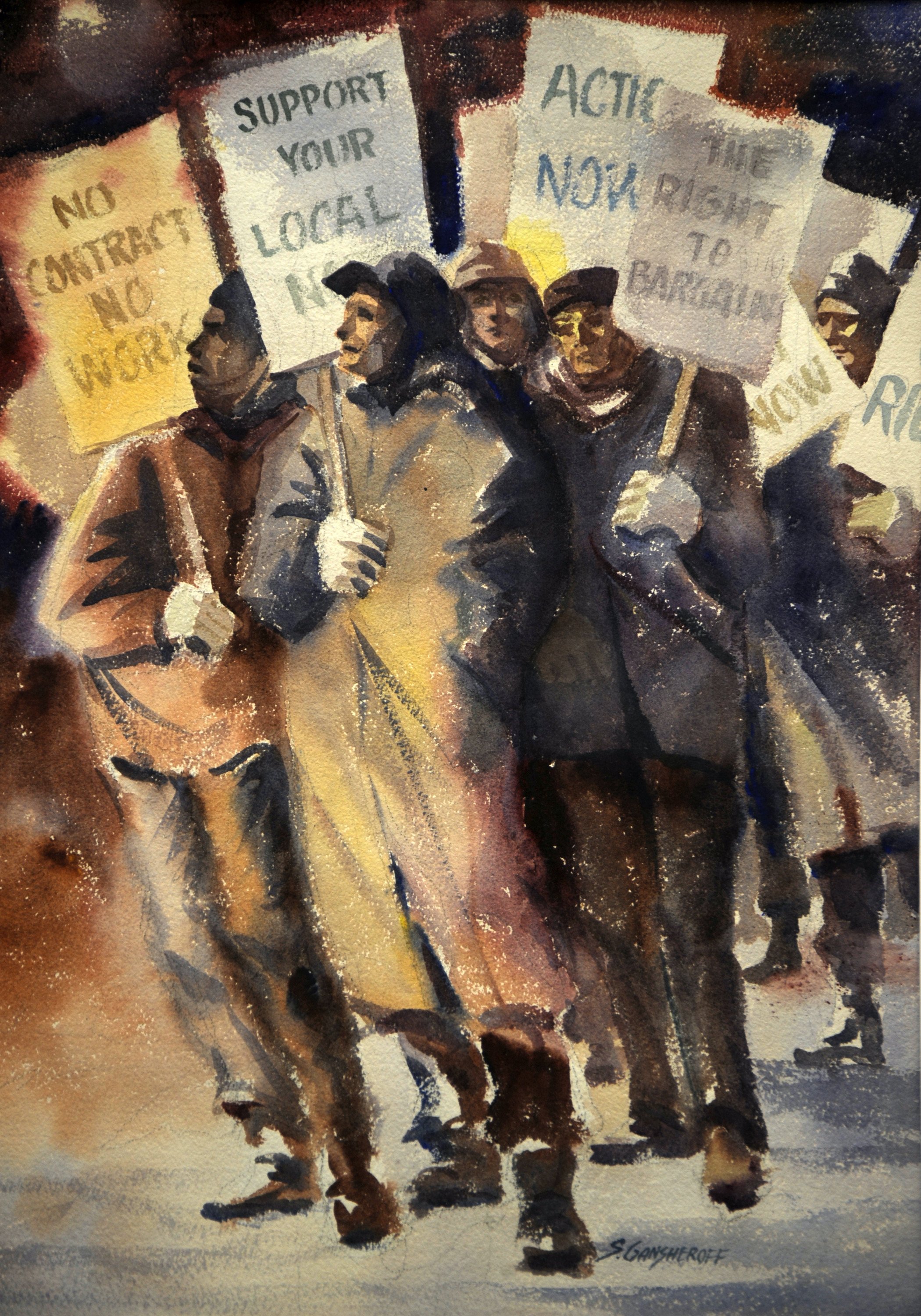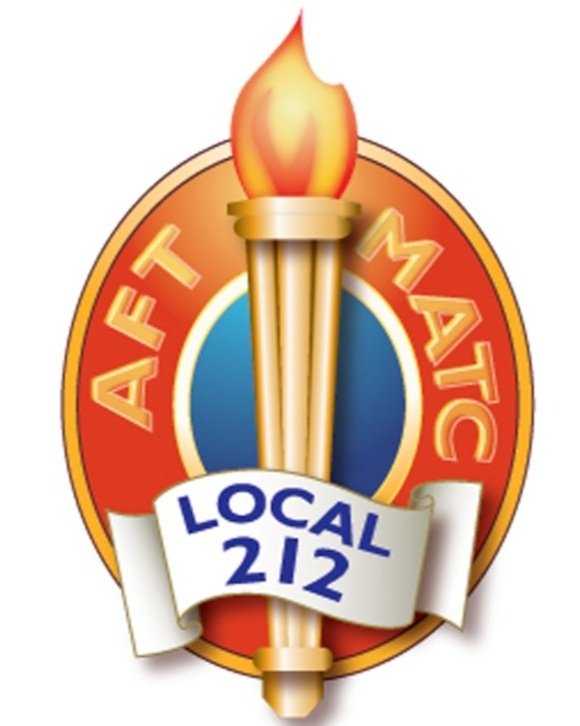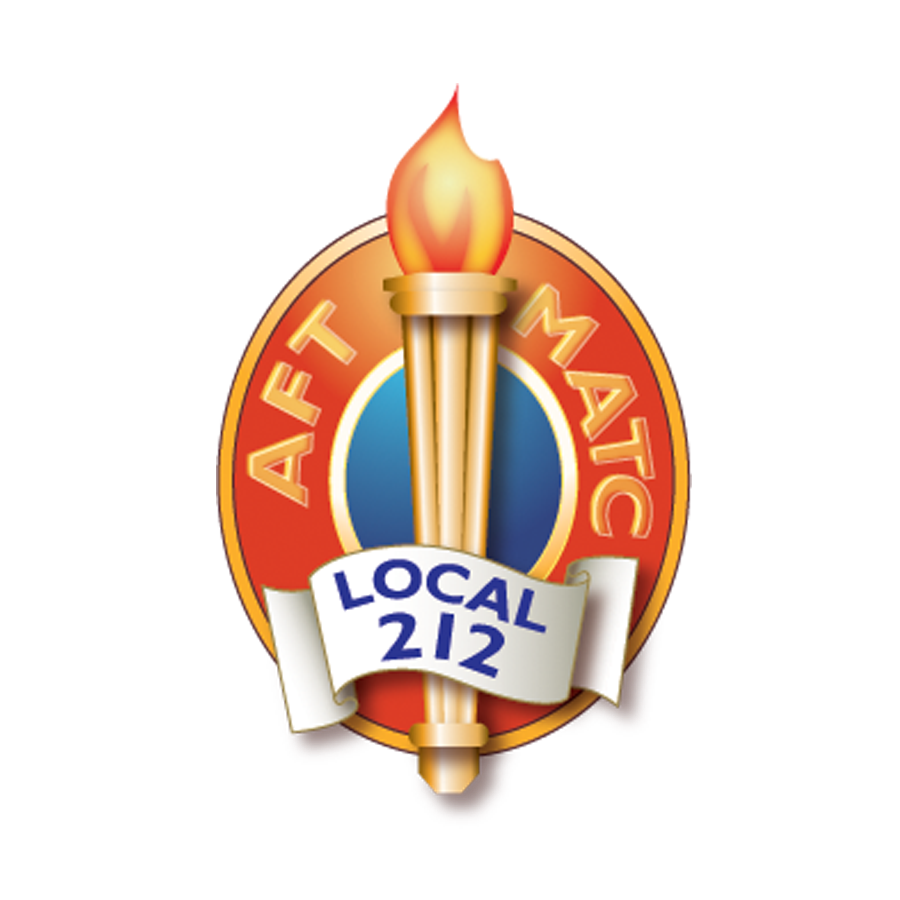
A Brief History of Local 212
1930s
Local 212 Officially Established
Local 212 was officially established when the American Federation of Teachers (AFT) granted a charter to the Milwaukee Vocational Teachers’ Association, Local 212, on January 27, 1930.
The Milwaukee Vocational School’s faculty organized Local 212 to have a voice on educational and employment matters. It took tremendous courage to organize. Early meetings were held secretly in the college’s boiler room. Termination was a constant threat.
From its inception, Local 212 recognized the importance of collective action, member mobilization, political action, and working with the MATC District Board.
Several issues led to the faculty’s decision to unionize including long hours, low pay, unprofessional treatment, the lack of due process, and discriminatory treatment of female employees who were paid less than men for comparable work and were expected to quit if they married. If unmarried female teachers became pregnant, they were fired immediately for moral degeneracy. .
As soon as it was chartered, Local 212, with the support of the labor movement, launched a successful legislative campaign for tenure. It was not the last time Local 212 would petition the state legislature.
Foundation of Class and Step Salary Schedule
Once tenure was secured, the fledging union began a campaign to replace the college’s discriminatory and inconsistent pay practices with a single, transparent salary schedule. In response, the MATC Board established one of MATC’s first shared decision- making committees composed of board members and faculty from various departments. The committee proposed a single salary schedule based on education attainment and years of experience that was adopted by the MATC Board in 1937 and is the foundation for the current class and step salary schedule.
By the 1930s MATC was the nation’s largest vocational school with over 20,000 students. The Adult High School was established in 1931 during the Great Depression.
Major Challenge to the Union’s Existence
A major challenge to the union’s existence occurred in 1937 acting Director William Rasche fired two Local 212 leaders accusing them of insubordination for refusing to serve as elevator operators. But that was an excuse. The real reason these senior instructors were fired was because they were active and effective union leaders. At the time, only 50 out of 250 teachers were Local 212 members.
The union organized against the unjust firings, demanding that MATC reinstate its leaders. The terminations and resulting struggle were covered extensively by the local media. MATC’s students struck and launched a petition drive in support of their fired teachers. Eventually, the MATC District Board voted 3-2 to reinstate the terminated instructors. The right of MATC’s teachers to unionize was largely ratified by this decision.
1940s & 1950s
The 1940’s and 1950s were a time of relative harmony between the college administration and union. During WWII MATC was open 24 hours a day as its faculty devoted themselves to educating and training the workforce needed to defeat fascism. Following the war the college hired hundreds of new faculty and staff to provide the industrial labor force for Milwaukee’s booming economy.
MATC Granted Public Television Licenses
In the mid-1950s the college became embroiled in controversy over its desire to operate a public television station. Despite fierce opposition from commercial stations, including the Hearst Corporation, taxpayer organizations and Senator Joseph McCarthy, MATC was granted public television licenses and began broadcasting what today are channels 10 and 36 on October 28, 1957.
Employment Relations Law, Section 111.70
In 1959 the Wisconsin legislature passed a new employment relations law, Section 111.70 that granted public employees the right to unionize and collectively bargain. Two years later, under the leadership of Local 212 President Dr. Phil Blank, the union began pursuing recognition as the legal representative of MATC’s faculty.
Local 212’s effort was challenged by an organization of non-union teachers, the Milwaukee Vocational and Adult Schools Education Association (MVASEA), which opposed unionization and collective bargaining. Local 212 had long characterized the Education Association as a “company union.”
Local 212 Certified as MATC’s Faculty Union
After an intense eight and one half month election campaign, Local 212 was certified as MATC’s faculty union by a vote of 149 to 99.
In a highlight for both the Wisconsin and national labor movement, in 1966 Local 212 became the first higher education local union in the United States to successfully negotiate a contract.
1960s
Faculty Walked the Picket Lines in the Bitter Cold for 44 Days
A major challenge to Local 212’s existence occurred in 1968-69. The lack of good faith bargaining on the part of the District Board led to a bitter strike in January, 1969. For over a month the faculty, led by President Bill Thomas and Carston Koeller, Chair of Contract Enforcement, walked the picket lines in the bitter cold.
After 44 days, the MATC administration and board agreed to a new collective bargaining agreement with Local 212 that included numerous benefits. Among them, the college president agreed to meet monthly with Local 212 representatives; non-professional duties such as hall monitoring and elevator duty were eliminated; and the requirement that faculty punch a time clock was discontinued. Compensation and benefits were significantly improved so that today they are the best in the state and among the best in the nation.
1970s
Paraprofessionals Recognized as a Separate Bargaining Unit
During the 1970s and early 80’s Local 212 expanded its ranks by successfully organizing MATC’s counselors and professional staff. The counselors joined the same bargaining unit as full-time faculty. The paraprofessionals were recognized as a separate bargaining unit.
1980s
Significant Advancements in Pay, Benefits, Shared Governance and Professional Development
In 1988 MATC President, Russ Slicker, proposed closing the MATC foundry program. After a lengthy battle the program was eliminated. But out of that struggle Ernst Schnook, a graduate of the MATC foundry program and a foundry instructor, emerged as a Local 212 leader. Schnook was elected President of Local 212 in 1990. Under his leadership Local 212 made significant advances in pay, benefits, shared governance and professional development. For example, under Schnook Local 212 established award-winning innovations such as Education Research and Development and Peer Support. Schnook won acceptance of shared governance core committees, and during his tenure Local 212 acquired its current office at 739 West Juneau.
Five-Star Early Childhood Development Learning Lab Centers provided at Each Campus
Local 212 also worked closely with the MATC administration to promote a successful $49 million building and modernization referendum that resulted in the construction of MATC’s five-star Early Childhood Education Learning Lab centers at each campus, a new Health Sciences Building to accommodate the college’s area of fastest enrollment growth, a shooting range for the South Campus’ police science program, a north campus burn house for fire fighter training, and other long delayed projects.
1990s
Local 212 Became First Union in the State to Organize its Part-Time Faculty.
Local 212 expanded its ranks in 1993 when it became the first union in the state to organize its part- time faculty. Shortly after winning union recognition, Local 212 successful negotiated a labor agreement, and part-time faculty’s pay was increased from $14 an hour with no prep time to a pro-rated percentage of the full-time pay. In addition the contract stipulated that part-time faculty would be paid for office hours and prep time. In the years that followed, part-time faculty’s pay and voice expanded, so that their salaries are among the highest in the country, and they received priority access to full-time positions.
Milwaukee Public Television Under Attack
Milwaukee Public Television, which is also the college’s TV and Video Production Program’s Learning Lab, became the center of controversy again in 1998 when the station manager, the Friends of Channels 10/36, and the right-wing Bradley Foundation attempted to privatize the station. Local 212 joined with former Milwaukee Mayor Frank Zeidler, who had helped MATC secure the television licenses in 1956, and other prominent citizens to form a committee to defend public television. Following a public hearing the MATC Board voted 8 to 0 to 1 to maintain the licenses and continue operating Milwaukee Public Television.
Budget Deficits Threats
In 1998 MATC’s President, John Birkholz, threatened to lay off seventeen faculty and five other 212 members in response to a alleged budget deficit. Local 212 mobilized its members for a public hearing and at board meetings, with the result that the layoffs were called off.
Only six years later, Birkholz’ successor, Dr. Darnel Cole, citing a budget deficit threatened to eliminate MATC nationally recognized Early Childhood Education Learning Labs, the Multicultural Office, the Bilingual Office and the Adult High School. Kevin Mulvenna, who later served as Local 212’s Executive Vice President, led local 212’s effort to organize the Adult High School’s faculty and students. Following a public hearing where the importance and effectiveness of the Adult High School were detailed, the proposal to close it was rescinded.
Local 212 also worked closely with the Latino and Hmong communities to oppose Cole’s plan to eliminate of the college’s Bilingual and Multicultural Programs. They were joined by community leaders including the President of the Milwaukee Common Council. Following impassioned testimony at a standing room only Board Meeting, the administration dropped its proposals to eliminate these important programs.
2000s
Got Contract?
In 2006 with contract negotiations at a standstill, the MATC Board gave MATC’s president a substantial raise. Local 212 responded with a “Got Contract? Dr. Cole does!” campaign. Following several rallies at monthly Board meetings, a new contract with significant improvements was agreed upon.
The following year discontent with Dr. Cole reached new heights. Local 212 held a vote asking faculty, counselors and professional staff to grade MATC’s President. The result- Dr. Cole earned a D- cumulative grade from the college’s educators.
Michael Rosen Appointed to the Wisconsin Technical College System State Board
In 2005 Governor Jim Doyle appointed Local 212 President, Michael Rosen, the Wisconsin Technical College System State Board. It was the first time that a Local 212 member had been appointed to the system’s governing body. However, the Wisconsin Senate under Republican leadership rejected the Rosen appointment. It was the first time the Wisconsin Senate had rejected a gubernatorial appointment since the late 1960s when it rejected Milwaukee’s former socialist mayor Frank Zeidler appointment to a monor state board. Rosen was reappointed by Doyle during the summer recess and his appointment was confirmed after Democrats won control of the Senate that November.
2010s
Governor Walker Attacks Unions
At Coordination Day in August, 2010, Rosen and Executive VP Charlie Dee warned the faculty about the dire consequences to public education if Scott Walker was to win election for Governor. But even Local 212’s leadership underestimated the severity of Walker’s attack. Immediately after being inaugurated Walker announced Act 10, a law that eliminated virtually all public employee collective bargaining rights, the very rights that had been established in 1959. Local 212 members walked out of an in-service day program in protest. Hundreds of Local 212 members also joined the massive peaceful, but ultimately unsuccessful, protests at the Capitol.
Hostile Takeover of the MATC Board
A year later, Senator Glen Grothman (R) proposed a hostile takeover of the MATC Board by proposing to change the board’s composition and selection process. Local 212 mobilized against this attack on democracy that was written by lobbyists employed by the Metropolitan Milwaukee Chamber of Commerce (MMAC). It culminated in the second longest filibuster in state legislature history as Democrats held up the vote on the legislation for 36 hours. Eventually the takeover bill targeting MATC passed.
For Profit Colleges Take Toll on Students
During December of that year, Local 212 organized a city-wide coalition to oppose Everest College, the technical college branch of the notorious for- profit Corinthian College, setting up two blocks from campus. While the city eventually allowed Everest to begin operations, subsidizing the development with $11 million in interest free bonds, Local 212 was successful in exposing how diploma mills gamed the federal financial aid system and took advantage of students. Everest, operating with a drop-out rate over 50% and job placement rate of less than 6%, was forced to close in 2012. Today MATC’s Health Occupation Programs occupies the former Everest College building.
MATC Administration Develop Employee Handbook
Following the expiration of the last labor agreements negotiated before Act 10 in March, 2013, Local 212 leaders devoted almost two years working with the MATC administration to develop an Employee Handbook that replaced the expired contracts. The result was the strongest handbook at any technical college in the state. It maintained just-cause status, a legitimate grievance procedure, the class and step salary schedule, and part-time compensation as a percentage of full time pay among other language from the old contracts.
Founding of the FAST Fund
In 2016 members of Local 212 created the FAST Fund to provide financial assistance to MATC students experiencing economic emergencies. The FAST Fund began as a pilot program in 2016-17 providing assistance to 26 students, but has continued to grow as a non-profit organization. In 2022, the FAST Fund provided assistance to 1,668 students with over $425,000 of direct aid and helped secure an additional $98,441 from other community agencies.
The FAST Fund works closely with community partners including Community Advocates, Milwaukee Social Development Commission, Hunger Task Force, MATC’s Dreamkeepers, the Wisconsin Energy Assistance Program, Legal Aid, and Legal Action, to maximize resources for MATC students and make the most efficient use of the FAST Fund’s revenues.
The FAST Fund is governed by a Board of Directors of community members and staffed by six MATC retiree volunteers. The Executive Director is the FAST Fund’s only full-time staff member. MATC’s faculty union, AFT Local 212, provides the FAST Fund with an office and administrative support.
Local 212 Has Recertified Annually Under the State’s Anti-Union Act 10, Winning Landslide Victories With Over 95% of the Vote.
Today Local 212 and its membership can be proud of our many contributions:
The Milwaukee area’s unparalleled skilled and technical workforce: our graduates
Education Research and Development, a model, union led, professional development program
MATC’s award winning, five-star Early Childhood Education Centers
Shared decision-making hiring committees
Milwaukee Public Television
Low student-professor ratios in classrooms, labs and clinicals
Compensation that reflects the faculty’s professional accomplishments
A culture of activism
Career ladders for part-time faculty and professional staff
A part-time faculty handbook that ranks among the best in the state and nation
An Employee Handbook that preserves the principle of shared decision-making
Through it all, technical and career education has flourished, and Local 212 has grown from representing a handful of teachers to nearly 1000 full and part-time instructors, as well as the college’s professional support staff.
You are a product of this history. You stand on the shoulders of those who came before you.
Your compensation, benefits, job security, working and teaching conditions are the product of your predecessors’ efforts and courage. Local 212’s history teaches us that there is no room for complacency. Educators must be actively engaged with our colleagues, our students and the communities we serve in fighting for MATC and a more just society.
MATC employees and their organization, Local 212, continue to provide education, hope and opportunity to the thousands of student who enter our doors each semester and to ensure that MATC remains an institution that values and promotes career and technical education.
For a list of more recent accomplishments CLICK HERE


